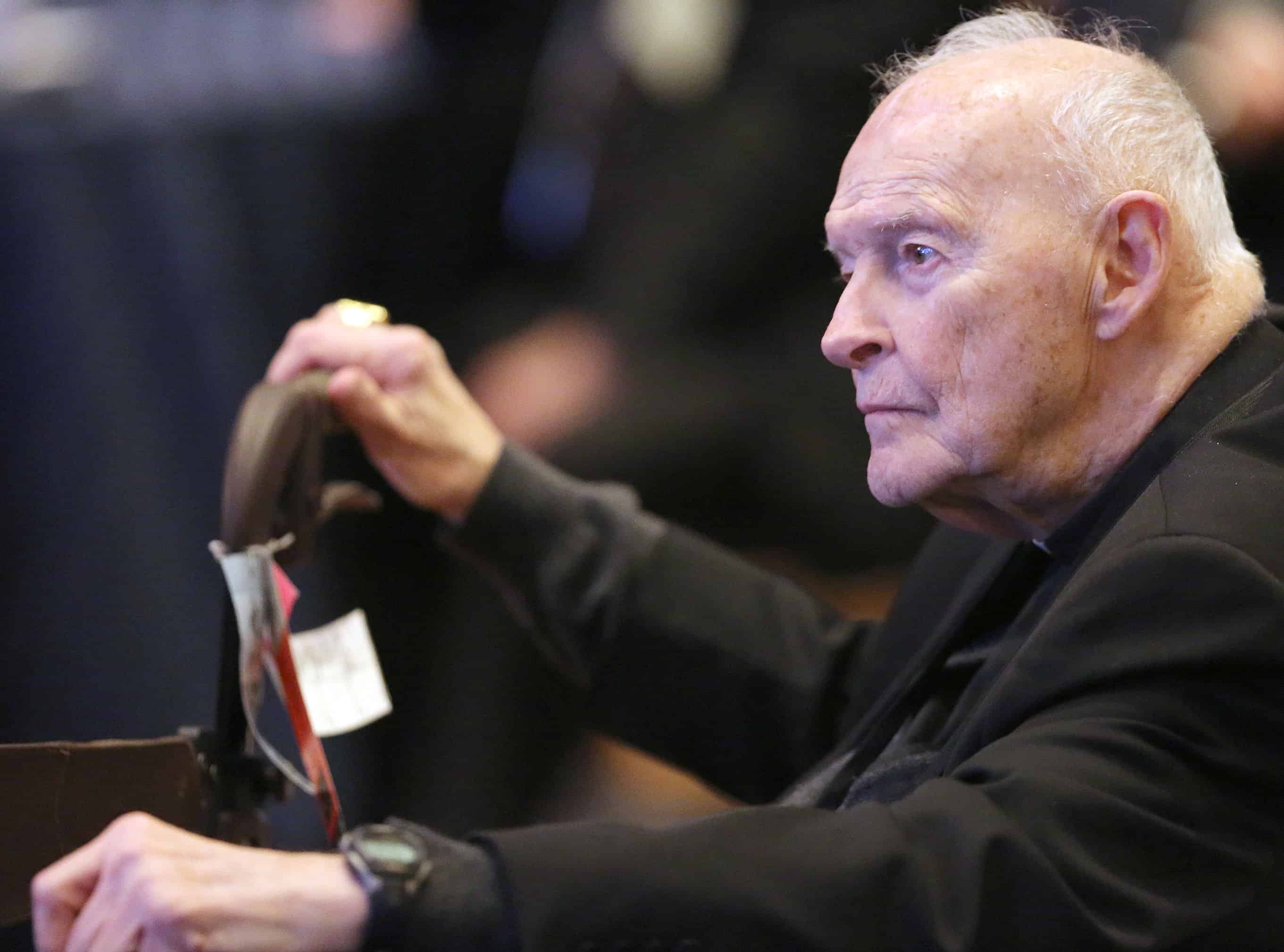The troubling case of Cardinal Theodore McCarrick has become yet more troubling, as the details of previous settlements made to former priests who accused Cardinal McCarrick of inappropriate behavior was reported on the front page of The New York Times. The Church’s hierarchy, rather than leading the Church into the 21st century, seems hopelessly mired in a decadence and corruption that one would expect to find in a history of the Renaissance Popes.
At least the Renaissance Church gave us great art and architecture.
When previously writing about this topic, I focused on how networks within the Church conceal and enable behavior similar to what Cardinal McCarrick has been accused and how such secrecy and predations invert the Church into a mockery of the self-forgetting sacrificial love of God. Now, as details emerge about how Cardinal McCarrick allegedly used his power and influence, it is imperative to ask why such trust is abused in the first place.
Per the Times’ reporting, the complaints and settlements, previously undisclosed, concerned then-Bishop McCarrick’s invitation of seminarians and young priests under his authority to stay at with him away from his official residences. According to the complaints of those who received settlements, McCarrick allegedly invited individuals to share his bed, where he is accused of touching them inappropriately.
Unlike the previous accusation of sexual abuse of a minor leveled against Cardinal McCarrick (accusations found “credible and substantiated” by a tribunal of the Archdiocese of New York), the settlements in these cases refer to consensual activity between adults and there is no indication that anything criminal occurred. That, however, is the lowest of low bars and the engineering of consent in these instances is a mere fig leaf to cover over a terrible abuse of trust, the trust that is placed in a religious superior by those bound to obey and follow him.
As we have learned from similar instances in the worlds of Hollywood, business, and politics, the imbalance of power dramatically shapes the relational and emotional space between otherwise free and relatively autonomous adults. An advance, unwelcomed or otherwise, from someone holding authority over you, be it from a movie executive or a future cardinal, is not as easily dismissed as a similar invitation or gesture from a colleague or from someone outside the sphere of work and career; a person trapped between the demands and abuse of power and the maintenance of their personal integrity might find it difficult, if not impossible, to exercise their freedom in that moment. This wrenching conundrum is exploited by those with power and, thus, the willing trust and faith of a subordinate is abused.
Sadly, this universal problem is profoundly felt within the hierarchical world of the Catholic Church, where vast amounts of unaccountable power and influence over large numbers of people are vested in the hands of relatively few. A bishop like McCarrick would have considerable power and influence over his priests and seminarians, determining where they are to serve and study, if they are to be elevated to ministries and apostolates of importance or to languish in obscurity. Those subject to such authority, especially when abused, are in a terrible bind.
The tension is amplified by the very nature of religious authority and the accompanying obedience of those bound to follow bishops, priests, and religious superiors. St Ignatius of Loyola himself, writing to Jesuit scholastics in Portugal, advised them to regard the wishes and commands of their superior as if they were the very wishes and commands of God. Ignatius certainly had good reasons for thinking this way: the Church, established by Jesus Christ and preserved by the Holy Spirit, participates in God’s plan of salvation through the very life and activity of the Church, holy and important activity that has endured and thrived through the centuries under the leadership of wise and heroic bishops, priests, and religious superiors. Yet, like all human endeavors (especially the ones that truly matter), sin, weakness, and evil infect everything. In this intersection of the personal, the political, and the religious, the opportunity for abuse and coercion are high for those with the means and the motives, as we have seen at many times and places. That the authority Cardinal McCarrick abused was a holy authority ordained by God makes it even worse.
That power is abused is hardly revelatory; Lord Acton’s remark that great men are usually bad men is a truism at this point. The Anglo-Saxon proverb that a man shows us what he is like when he can do as he pleases is borne out by many actors on the many stages of the world. What this episode shows us is that great men are not only usually bad men but weak men. And this weakness is what we see when a man can do as he pleases.
This weakness is not alien to us. Most of us are not in positions of great power and authority. But we are not permitted to say, as the Pharisee praying in the synagogue in Luke’s Gospel says, that we are grateful that we are not like most people. We know that the struggle with sin and evil takes place in every heart, especially our own. Ultimately, any solution directs us to ponder our loves. Are we filled with the love of God that impels us to love our neighbor with a love that mirrors God’s own for us? Or has our pride and weakness curved us in on ourselves that we love only ourselves and seek only the satisfaction of ourselves, to the detriment and abuse of those around us, our least brothers and sisters?
Regrettably, there has been far too much of the latter in the Catholic Church throughout the entire world, much of which has likely yet to be revealed. Enabled by power, secrecy, and trust, too many in the Church have chosen self-love over love of God and neighbor, with terrible harm, abuse, and neglect inflicted upon those who fell victim. That these victims, whether minors or adults subject to the abuser’s authority, looked to their abusers as God’s chosen shepherds and leaders makes the crime of choosing to love self over all else even more damnable. If the Church wishes to regain even a fraction of its shattered credibility and a measure of its prophetic voice in the world, then the cry from the faithful must be simple: accountability, now.
Throughout the history of Christian writing, a common motif for the Church is that of a pilgrimage. Often, this image carries with it a sense of exile, a sense that the people of the Church have been exiled from their true home and long to return. While I believe, with Saint Paul, that there is nothing that can truly separate us from the incredible love of God, the sense of a lost Church wandering on a pilgrimage of exile is strongest when I consider what has taken place within the Church, what has been done by men in the Church. Exiled and seemingly trapped in an endless season of advent without Christmas, of Lent without Easter, I wonder if there are any good guides for us, when the trust of so many has been grievously misplaced. To what home are we going? To whom can we place our trust and follow?
Like the Renaissance Church, which faced similar corruption at the highest levels of the Church hierarchy, we desperately need saints to emerge and show us the way home again. For all the great good that reform and greater accountability will do, we need another Francis of Assisi, another Catherine of Siena, a Bonaventure or an Aquinas. We need a new Teresa of Avila, a new Ignatius of Loyola to come forth and call the Church from abuse, neglect, and false self-love to faith, hope, and love. We may need a kind of saint who we, at this moment, are unable to imagine or predict. Let those with ears to hear and eyes to see be on the lookout for the saints God will call to remind us of the newness of life promised in the Gospel, the newness of life that is the love of God and neighbor given and shared with us by Christ and through the Holy Spirit. We need to find them, need to elevate them, be inspired by them.
Heck, be open to the call to be that saint for whom the people of God desperately cry.


